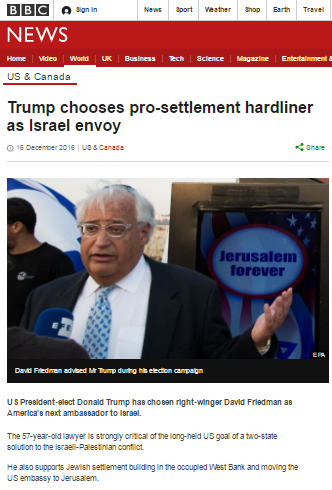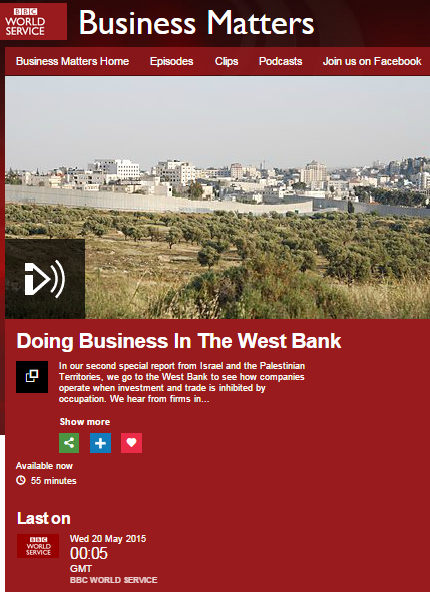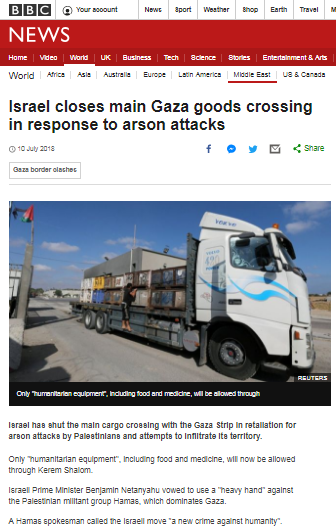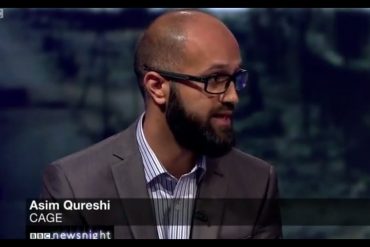Readers may recall that in late October the BBC’s Middle East editor published an article titled “Is a new Arab Spring unfolding in the Middle East?” in which he ignored the anti-Iran component of popular demonstrations in Iraq and Lebanon.
Since then the BBC News website has produced related content which has included a filmed report claiming “common causes” between the protests in Iraq and Lebanon and those in Ecuador, Chile, Spain and Hong Kong and a written article on the protests in Iraq which claims to provide “all the background you need to know” but which offers just 51 words of explanation in answer to the question “Why are the protesters also angry at Iran?”.
“They accuse the country of complicity in Iraq’s governance failure and corruption.
Iran’s influence over Iraq’s internal affairs has grown steadily since 2003. It has close links to Shia politicians who are part of the ruling elite, and has backed the paramilitary Popular Mobilisation force, which is dominated by Shia militias.”
On December 5th – over a month and a half after the protests in Lebanon began – the BBC News website published a long filmed report by the BBC’s Middle East editor titled “What’s behind the wave of Middle East protests?”.
“You might remember the uprisings in the Middle East in 2011. As dictators were toppled hundreds of thousands of protesters called for change, for freedom and a new start. Their high hopes came to very little and the region lurched back towards war and repression.
But the grievances that drove the 2011 uprisings – the so-called Arab Spring – never went away. 2019 might be the year it started again. Already protests have forced the resignations of two Prime Ministers – in Lebanon and Iraq.
Since October there have been big, mainly peaceful protests in Lebanon and extremely bloody ones in Iraq. And in Iran, hundreds have been shot dead at protests in the last few weeks.
BBC Middle East Editor Jeremy Bowen has been trying to make sense of it all in Lebanon’s capital, Beirut.”

Most of that almost ten and a half minute-long video relates to the protests in Lebanon, with focus on their economic aspects. From 06:45 however viewers see an unidentified Lebanese woman describe the demand of the protesters in Iraq as “to live better in a country free of militias”. She goes on to say “we [in Lebanon] want to live in dignity in our country, free of any foreign influence” but viewers see no explanation of her words.
Only nearly eight minutes into the report does Bowen inform viewers that:
“They [protesters in Iraq] don’t just blame their own inept politicians, they’re also targeting Iraq’s alliance with Iran, torching its consulates in the holy cities of Najaf and Karbala. For Iran this was supposed to be friendly territory.”
Mentioning the Lebanese terrorist organisation for the first time, Bowen goes on:
“Hezbollah’s patrons in Iran have serious problems at home too. Big protests started in Iran in the last fortnight after a rise in petrol prices. Crushing American sanctions have made matters worse in an economy already weakened by corruption and mismanagement. BBC Persian estimates that more than 200 were killed by the regime.”
Offering no explanation as to why those “crushing American sanctions” were imposed, Bowen returns to Lebanon:
“Iran’s ally Hezbollah sent thugs to try to break up the demonstrations in Beirut, without success. But that’s not the end of it. Hezbollah is powerful and heavily armed and it’s worked for 40 years to dominate Lebanon. The status quo suits them and they don’t want it to change.”
With less than a minute and a half of the report left, Bowen presents his concluding analysis:
“Well the time’s come now to try to join the dots. Let’s say there are two main camps in the Middle East. One of them we can call ‘Team America’. It also includes Saudi Arabia and Israel. The other one is ‘Team Iran’. It also includes the Assad regime in Syria, Iraq and the strongest single group here in Lebanon, Hezbollah, which is a Shia Muslim movement. Now the Iranians need their allies. They use them to try to project power. But they’ve got a real problem at the moment because the demonstrations have shown that anti-Iranian feeling is growing in Iraq and here in Lebanon. Across the region there are demonstrations against local grievances and their shared deep-seated anger that crosses borders among the young, who want to sweep away discredited, corrupt and inept leaders. It all feeds into the geo-political instability of the world’s most turbulent region. Another storm is brewing in the Middle East.”
So although it took over a month for Bowen to “join the dots”, BBC audiences did finally get to hear something about the anti-Iran component of the demonstrations in Iraq and Lebanon. However the man tasked with “providing analysis that might make a complex story more comprehensive or comprehensible for the audience” made no attempt to explain to audiences what lies behind either Iran’s efforts to “project power” or the “anti-Iranian feeling” in Iraq and Lebanon, while portraying an internationally active terrorist organisation merely as “a Shia Muslim movement”.
One of the conclusions of the 2012 report into the BBC’s coverage of the ‘Arab Spring’ was that it required more “breadth and context”.
“Alison Hastings, chair of the BBC Trust’s editorial standards committee […] added that the trust was also “keen to see if improvements can be made”. “These would be both in the scope of coverage to provide a fuller picture of events, and in providing better context for audiences.”
Should Bowen’s predictions of a ‘brewing storm’ materialise, BBC audiences will once again lack the context which will help them understand the broader picture.
Related Articles:
BBC WS radio framing of anti-Iran protests




